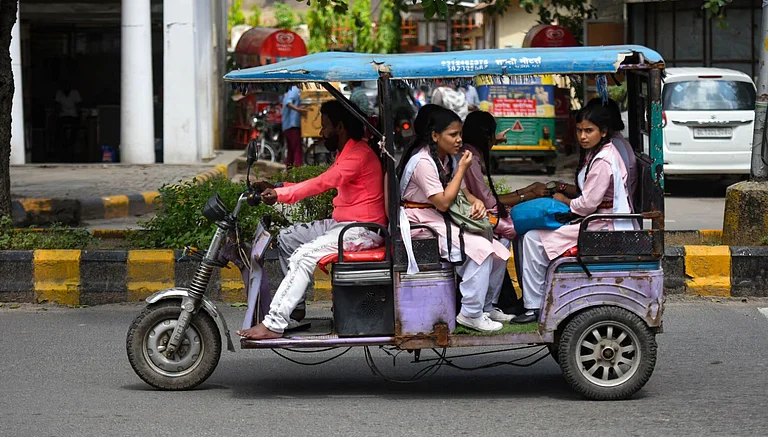LAST week I had my first McDonald's burger. As we took our table, and were parking our two-year-old daughter on a chair, a waiter wheeled over a special raised baby chair with seat belts. After some time, another came over and handed her a paper flag. Of course, it read "I love McDonald", but the red-and-yellow plaything kept her happily busy while we finished our milkshakes.
The next day, with two colleagues, I visited the office of a cellular service provider who had advertised what looked like a very good bargain. All three of us were eager to know how soon we could complete the formalities and go back with our cellphones. Two models were shown to us, one for Rs 13,500, another for Rs 19,000. How was one different from the other? Slight pause, then, with an affected American accent, came the answer: "Well, the first difference is of course the price." Within five minutes, this unsmiling, uncooperative and stupid salesman convinced us that no way were we going to buy a cellphone—or anything—from this company. We have been busily calling up friends and spreading the doctrine.
Whatever I may be—manager, lawyer, ventriloquist, ear-cleaner, snake charmer—I am also a consumer. I will settle for a pleasurable value-for-money meal even if, as a consequence, my child becomes an inadvertent advertising medium for the brand for a few minutes. I will not buy something when the salesman does not treat me with respect. And I don't give a damn about whether the product is Indian or Sudanese.
1996 saw a giant battle between two opposite forces: globalisation and privatisation versus 'Indianness', a force which has, startlingly, brought the extreme left and extreme right of our polity together. Of course, this too shall pass, for this is the transitional phase of a Tectonic shift our economy and society are going through. It is also fairly clear which side will win, unless we choose to be an isolated freak nation like Albania. One just wishes there was less pain in change.
All the business and economic setbacks of 1996—for setbacks have outnumbered glad tidings—can be seen as the pangs of a nation waking up to the global reality. They were also the necessary penance for the excesses of the first few years of liberalisation. Why did the common investor stay away from the stockmarket? Because over the last three years, with many controls removed, fly-by-nighters crowded the market and cheated him. And he stayed away because he no longer believes the annual results that companies announce.
But if the investor refused industry a free lunch, our businessmen also woke up this year to real global standards. Which do not have place for every Rs 200-crore group announcing huge petrochemical and steel projects, or for promoters amassing wealth at the expense of their companies and other shareholders. Or foreign partners overlooking the unorthodox—by global standards—business practices that Indian industry has followed for decades. Historically, Indian industrialists got into various businesses solely because that particular government licence was available at that point of time. Over the years, rather than learn the business, many of them became experts in siphoning money out of the manufacturing and selling processes to enrich themselves. For those who didn't change their ways, 1996 was a bad year, and the coming years will be worse. Attending countless seminars on 'corporate governance' won't help. There's no place for them in the global economy.
Which is, in the final analysis, ruled by the principles of free will and choice. As dozens of international marketers who thought that they could flaunt their brand names and sell at ultra-inflated prices in India have realised in the last few years. The average Indian is no fool. And the flag-bearers of economic nationalism too should have some respect for him. To imagine that a 5,000-year heritage is in danger from an American chain selling fried chicken is insulting to that heritage. Also, I wonder, when was the last time that any politician raising the spectre of economic imperialism stood in a queue in a nationalised bank to have his cheque cashed, had to grovel to get his sick child admitted to a government hospital, had to wheedle with a clerk to get his insurance claim after his house had been burgled? Why has not a single doomsayer opposing the opening up of the insurance sector mentioned that the insurance schemes available currently are a rip-off compared to those of the developed world?
What's amazing is that given that the insurance clerk gets bad service from a railway clerk, who, when he goes to the bank, meets a rude cashier, who, in turn, is at the receiving end of surly waiters, why, then, don't these people indulge in the slightest bit of introspection about what's happening to them, around them? That in this vicious chain of bad deals, fuelled by half-truths about national honour, the real result is only a perpetuation of inefficiency and sloth, and everyone is cheated.
What 1997 will possibly make amply clear is that fears of the average Indian being brainwashed into mindlessly paying too much for things he doesn't need and thereby selling the nation to megalithic corporations are unfounded. Politicians do that sort of thing, not average Indians. Give me Indian food at the McDonald's price at that level of service, I'll happily gorge that. That isn't a very tall order.























